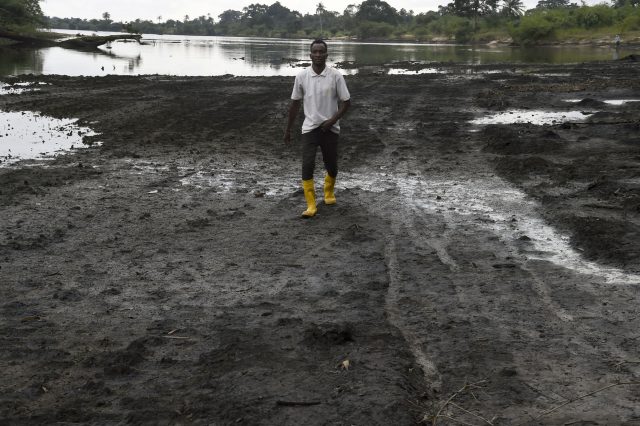A farmer walks on a marshy shore of a river polluted by oil spills at B-Dere, Ogoniland in Rivers State on August 23, 2021. – Oil firm Shell has agreed to compensate the Ejamah community and three villages in Ogoni community in southern oil and gas-rich Niger delta, which recently won $11 million in compensation to the community over a 1970’s spill that polluted over 225 hectares of their farmlands and fishing waters. (Photo by PIUS UTOMI EKPEI / AFP)
The Environmental Rights Action/Friends of the Earth Nigeria (ERA/FoEN) has urged the Royal Dutch Shell to remediate oil-polluted areas caused by its exploration activities before divesting its onshore assets from the Niger Delta region. It disclosed that Shell had launched the major divestment plan of its Nigerian assets in May 2021 through its Chief Executive Officer, Ben Van Beurden, saying it no longer views its activities in the Niger Delta region as cental to its business strategy.
Speaking at a media briefing in Port Harcourt, Executive Director of ERA/FoEN, Chima Williams, noted that the real reasons behind Shell’s plan to divest from the region were because of its decaying facilities, which has led to constant spillages and the realisation that it was no longer business as usual, as victims were fighting for their rights through legal means.
“It is no longer news that Shell has launched a major divestment of its Nigerian assets, especially those in the shallow water and onshore, while still retaining its offshore assets.
“The company has hired a bank to sell its Shell Petroleum Development Company of Nigeria Limited (SPDC) subsidiary in a deal touted as one of the biggest ever in the oil gas industry in Africa.
“Shell’s position as declared by Van Beurden during the company’s Annual General Meeting (AGM) in May 2021 on its divestment plan is that it no longer views its activities in the Niger Delta, as core to its strategy, which is driven by the pressure from its investors and that Shell could no longer afford to be exposed to the risk of theft and sabotage,” the group said.
Williams argued that the real reasons behind the divestment plan were embedded in the realities that the company was beginning to feel uncomfortable since it was no longer business as usual in the oil and gas sector.
Insisting that Shell’s decaying facilities were causing constant spillages and environmental pollution, Chima, however, warned would-be investors to bear in mind that they would buy assets and liabilities, stressing that Shell must only leave after cleaning up its mess and restituting its victims.
“While it is the investors’ prerogative to determine what happens with their investment, they must only leave after cleaning up their mess and restituting their victims.”
Shell’s decision does not end with a consideration of its profits and concerns of their investors, their victims should also have a stake,” he stressed.

